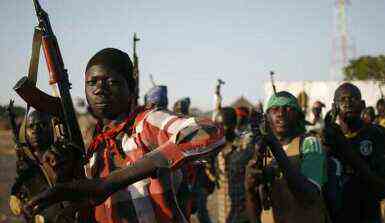South Sudan calls on Sudan to sever ties with rebels
August 17, 2014 (JUBA) – The South Sudanese government has urged the government of neighbouring Sudan to sever ties with rebels under the leadership of former vice-president Riek Machar, while reiterating its commitment to a 2012 bilateral deal between the two countries.

“What we are saying is that it should encourage Riek [Machar] and his group to stop the war and accept to give peaceful dialogue a chance,” South Sudan’s foreign affairs minister, Barnaba Marial Benjamin, told Sudan Tribune during an exclusive interview on Sunday.
The minister explained that Sudan, from which the South seceded in 2011, has a leading role to play in helping his government reach a peaceful settlement to the eight-month-long conflict, while urging its government to sever any ties with the rebel group and focus on peace negotiations currently being mediated by the Intergovernmental Authority on Development (IGAD) in the Ethiopian capital, Addis Ababa.
“The government of Sudan has a big role to play in the peace process if it can sever ties with this group, especially if there are invisible hands within the government who are dealing with them, they should be encouraged to stop,” said Benjamin.
He also praised the Sudanese government participation in the recent meeting of foreign ministers in the Kenyan capital, Nairobi, during which the head of the IGAD mediation team provided a general briefing on the progress of peace talks and the challenges remaining.
“The Sudanese government played substantive role in the recent IGAD foreign ministers meeting and it was clearly found that the rebels are the one causing all these unnecessary delays in the mediation process because of changing, unjustified demands,” he said.
He expressed his government’s commitment to the IGAD-led peace process and finding a lasting resolution to the conflict with the help of its regional partners.
“The government is fully committed to bringing peace. The president [Salva Kiir] and the entire leadership, the party and everybody else are for peace and we have never left the peace forum,” said Benjamin.
“Our delegation is now actively engaged in the negotiation with open minds. The problem is with the rebels and as you can see for the first time the mediators and the international community have now realised those who are violating the cessation of hostilities [agreement] are the rebels themselves. Our troops still have orders to respect the ceasefire,” he said, referring to a deal signed by both parties in January and recommitted to in May.
Meanwhile, the spokesman for the Sudanese army (SAF), Khaled al-Sawarmi, issued a denial on Saturday that his country was providing military support to South Sudanese rebels.
He has also maintained that a recent two-day visit by the rebel leader to Khartoum came within the framework of Sudan’s mediation efforts aimed at ending the crisis.
South Sudan has been embroiled in conflict since mid-December last year when a political rift within the country’s ruling party (SPLM) turned violent.
The fighting has killed thousands and displaced more than a million people, many of whom have fled to neighbouring countries, including Sudan.
The violence has continued despite January’s ceasefire deal and ongoing peace talks, with both sides seemingly unable to resolve their political differences.
(ST)
